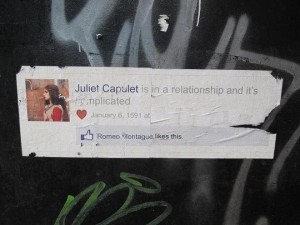
For those who don’t enjoy dramatic irony, too many books and movies provoke that frustrated question: “Why didn’t they just talk to each other?” Entire plot lines that hinge on only a few words of missed dialogue have been the backbone of classic comedies and dramas for centuries, but now modern technology may be making this literary device just too… unbelievable.
Wellman and Rainie, writing in the first issue of the new journal Mobile Media & Communication, illustrate this shift with a creative new twist on an old classic. What if Romeo and Juliet, those unfortunate teens who just missed each other in the end, had cell phones? Instead of talking through their feuding families, they could have just texted, maybe avoiding (spoiler alert!) the whole suicide mess.
Using research from their book Networked: The New Social Operating System, the authors argue that mobile phones and other portable communication devices have ushered in an era of “networked individualism.” We connect as individuals and share everything, down to our geographical location. The star-crossed lovers couldn’t even dream of satellite technology, but they were still pioneering individual networking by meeting alone, in secret, instead of involving their families to court each other formally. Even a decade ago, you’d have to call your paramour’s “home phone,” and maybe even talk to their parents.
Today a quick text makes individual socializing that much easier and more efficient, but it may also radically shift communication through our closest social groups. In our social lives and our dramatic writing, how much longer will we be able to believe people just didn’t get the message?

Comments 1
Barry Wellman — March 12, 2013
Thanks. Nicely written. One disagreement: I think they would be using mobile phones a decade ago, maybe even two decades ago.